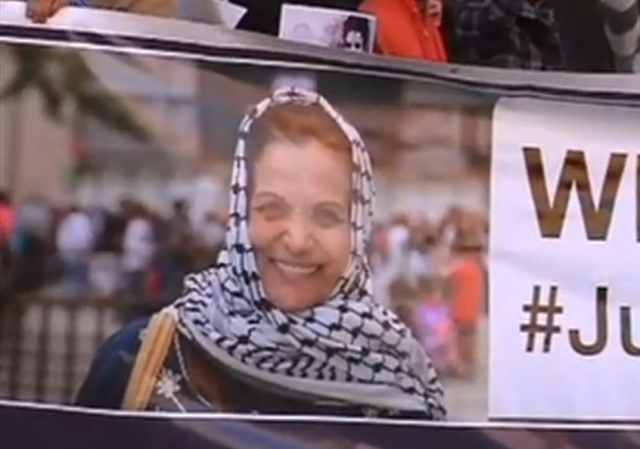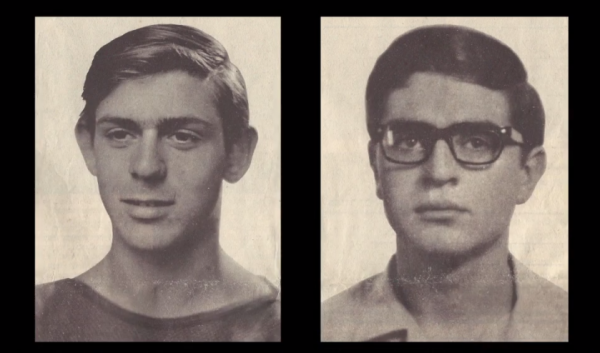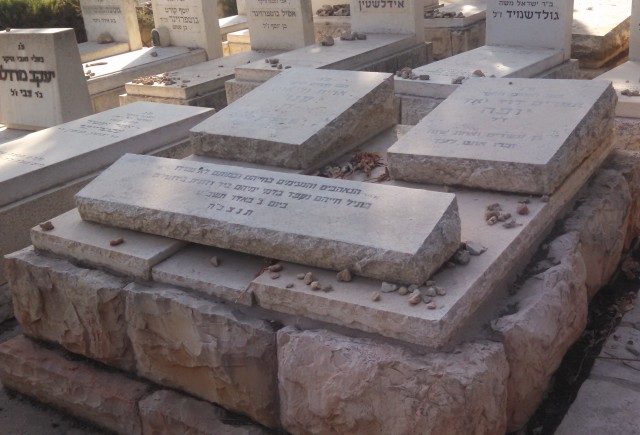Rasmea Odeh appeal twists into pretzel logic
Rasmea’s Reply Brief contorts itself to deal with her own trial testimony, which undermines appeal.

Rasmea Odeh is the supermarket bomber who killed Hebrew University students Edward Joffe and Leon Kanner in 1969, served 10 years in Israeli prison before being released in a prisoner exchange, and then made her way to the U.S. in the mid-1990s.
Rasmea then lied on her visa and naturalization applications, among other ways, by denying that she ever had been charged, convicted or imprisoned. Rasmea was convicted in federal court in Detroit in November 2014 of immigration fraud, sentenced to 18 months in prison, and ordered deported. Rasmea danced in the aisle of the bus back to Chicago after sentencing.
Rasmea is out on bond pending appeal.
We have covered many times how Rasmea is being treated as a hero by the anti-Israel activist community, based in part on her claim that her Israeli conviction was solely because she falsely confessed after 25 days of sexual torture.
In fact, Rasmea confessed just one day after arrest, there was substantial independent evidence, and even a Red Cross observer said she received a fair trial. Rasmea’s co-conspirator decades later would brag on video about how Rasmea planned the whole thing.
In our analysis of Rasmea’s initial Appeal Brief, we noted Rasmea Odeh Appeal has fundamental inconsistency:
But there is a fundamental inconsistency in the appeal that should taint, if not completely eviscerate, Rasmea’s legal arguments. Rasmea’s appeal takes the legally and factually inconsistent positions that Rasmea had an actual, conscious understanding of the word “EVER” that limited the time scope to her time in the United States in the context of other questions on the form; and separately, that PTSD from the alleged torture caused her to block out the Israeli conviction and imprisonment….
So which was it? Rasmea was conscious of the conviction and imprisonment but didn’t think the questions called for disclosure, or she blocked everything out because of PTSD arising from alleged torture more than 25 years earlier? You can’t have it both ways, but Rasmea’s appeal tries to.
This has profound implications for the legal aspects of Rasmea’s appeal. Her own trial testimony negates the claimed need for an expert witness, even assuming there were a legal basis for the expert; Rasmea would have been calling the expert to contradict Rasmea’s own trial testimony. This would render any legal error as to the expert “harmless” and not the basis to overturn the conviction.
Most of the prosecution brief was devoted to the legal issue raised by Rasmea as to whether the trial court applied the appropriate “intent” standard at trial. While I think the prosecution got it right on the intent standard, I also made clear that I don’t predict what an appeals courts will do in any case, no matter how seemingly obvious.
In addition, however, the prosecution picked up on the same point I made — that even if the judge applied the wrong intent standard, it was harmless error. That is because the intent standard only went to the issue of whether Rasmea could call an expert on PTSD. That would have required a hearing on whether the expert’s theories met the standards of certainty and professional acceptance to meet the rather high federal court hurdle, and whether the particular expert was qualified. The trial court never held such a hearing, because it ruled that under a “general intent” standard, such expert testimony was not permitted under existing appeals court precedent.
This may sound a little esoteric, and to some extent it is, but here’s the big picture. The expert’s proposed testimony actually contradicted Rasmea’s own testimony. She didn’t block out anything, by her own testimony, she just decided based on the sequence of the questions that the word “EVER” (in bold and caps in original naturalization form) only applied to her time in the United States. So, she consciously decided not to reveal her conviction and imprisonment, of which she was fully conscious and aware.
The jury obviously did not believe her, which is understandable. What don’t you understand about the word EVER?
The prosecution in its brief hit hard on this. From the government’s Brief (at 31-33):
The flaw in Odeh’s argument is that as she posits it, the expert testimony would have contradicted, not supported her trial testimony. At trial, Odeh testified that she was fully aware of her criminal history, and that upon analyzing the form, concluded in good faith that it did not request information about events other than in the United States.
Thus, when asked on direct examination why she had answered “No” to the criminal history questions on the naturalization application, Odeh testified that after reading previous questions, such as “Have you ever claimed to be U.S. Citizen in writing or any other way,” and “Have you ever registered to vote in any federal, state, or local election in the United States,” she consciously and rationally concluded that all the questions must refer to the United States. (R. 182: Tr., 2365–66). “When I continue the other questions, my understanding was about United States. So I continue to say, no, no, no.” (Id. at 2366).3 Odeh continued her direct testimony by answering the question, “when you were filling out that form and they asked you were you ever in prison or convicted or arrested, did you ever, did you think at all about what had happened to you in Israel in 1969 and 1970?” Odeh answered, “Never I thought about Israel. My understanding was about United States, and I believe if, if I knew that about Israel, I will say the truth.” (Id. at 2367).
When her attorney asked Odeh, “Is it your testimony that if you thought the questions referred to what happened to you in Israel, you would have answered those questions and given the information to the INS,” she replied “Yes. I will give them. Yes.” (Id.). To the question of “So is it your testimony that if you interpreted the question or understood the question to talk about what happened to you in Israel, you would have answered the question, yes, and given the information to the immigration [sic],” Odeh replied “Yes, if I understand that, of course.” (Id. at 2368)….
Thus, if the psychologist had testified, the jury would have been squarely presented with Odeh’s testimony that she consciously and in good faith analyzed and thought about the information and contradictory testimony from her own expert witness. It is a strange argument indeed which asserts that Odeh’s defense was impaired because she not allowed to present an expert who would have contradicted Odeh’s own testimony.
This afternoon, Rasmea’s attorney filed her Reply Brief (full embed at bottom of post). Much of the Reply Brief, not surprisingly, addressed the intent standard.
But in addressing Rasmea’s own trial testimony, defense counsel twisted himself into a pretzel of logic. Here are some key excerpts:
The expert’s opinion was that Ms. Odeh suffered from chronic PTSD,
resulting from her torture at the hands of the Israeli security forces in 1969 and
1970. She was of the further opinion that, that in 2004, when Ms. Odeh applied for
her naturalization, her stress disorder could well have operated as a ‘filter’,
blocking any association of the criminal history questions on the form with her
traumatic memories oftmiure and imprisonment 35 years before, in order to
protect her from the excruciating “flashback” physical memory of the torture
which she had often experienced in the intervening years.The expert, Dr. Mary Fabri, would have testified that the PTSD caused an
unconscious process to occur by which an automatic ‘filter’ altered the meaning of
the criminal history questions, as her conscious mind perceived them, so as to avoid triggering her traumatic memories. Dr. Fabri would have testified that such
a displacement of meaning or nanowing of interpretation is a typical protective
mechanism in the mentality of PTSD patients, and a plausible explanation of what
had occuned. Her testimony was crucial for the defense, since, without it the jury
was likely toand did indeed disbelieve that someone could have forgotten such an
enormous and overwhelming experience as her anest, conviction and
imprisonment.[Reply Brief, at 9-10]
I am highly doubtful that such supposed “expert testimony” would be allowed in federal court, but in any event, the trial court never held a hearing because of its ruling on intent. The appeals court should find that the failure to hold the hearing was harmless error because Rasmea testified at trial that she did remember the conviction and imprisonment.
So the entire thrust of the “expert” testimony would have been that Rasmea filtered out something Rasmea already testified she did not filter out.
The Reply Brief continues, recognizing it has a problem in the form of Rasmea’s own testimony:
Ms. Odeh testified that there were several questions on the form which dealt
specifically with her time in the United States—such as “Have you EVER (in the
same bold version) voted (or registered) in any Federal, state, or local election in
the United States?” (Ex. IA Pg. ID 2620) — which came before the criminal
history questions. She said that those references, especially since she had been
living in the U.S. for almost ten years, helped set the conscious framework for the
false impression, generated by the PTSD “filter”, that the later questions also
refened only to her time in the United States. [Reply Brief, at 10]* * *
The government’s reasoning is faulty. Quite naturally, Ms. Odeh “knew”
those things had happened to her in Israel, but the Disorder operated
subconsciously to block what she “knew” at that critical moment, and substitute an
anodyne mis-interpretation of the question, in order to block out the traumatic
memories. Thus the government’s brief wrongly conflates the fact that she agreed
that she “knew” what had happened to her in Israel in a general sense, with its own
unsupported supposition that she had a present-time awareness of that experience–
-and the memory of it—at the time she was confronted with the questions on the
form.This obviously begs the question entirely. If she had been aware, with active
knowledge of the atTest, etc. (and torture!) alive in her conscious mind at the
moment she answered the questions, ce1iainly she would have been knowingly,
willfully, lying when she marked the “No” boxes on the questions. That’s the
whole point of the expert testimony: to explain to the jury how the protective
mechanism of the PTSD worked, sub-consciously, to block conscious awareness in interpreting the questions, by narrowing the scope of the questions to avoid
recalling what she certainly “knew”, all too well, about what had happened to her. [Reply Brief at 11-12]
Will the Court of Appeals find that not allowing an expert to testify contrary to the facts actually testified to by the defendant was reversible error?
Oddly, it doesn’t appear that either side cited legal authority on this specific point, perhaps because no one has ever tried such a stunt before on appeal. The defense argument would have to go something like this:
Your Honors, we know that Ms. Odeh testified that at the time of signing the documents she actually remembered her conviction and imprisonment, and that she consciously decided that the sequence of questions did not call for that information, but we had an expert who was prepared to testify that Ms. Odeh was wrong, she didn’t really remember those things.
So Your Honors, we should get a new trial so Ms. Odeh can change her testimony and we can call the expert to claim she blocked it all out.
That would, of course, be a ludicrous argument. But apparently it is the one the defense plans on making in substance, if not words. It will be interesting to see how this plays out at oral argument.
There were other lies on her applications, such as her failure to disclose her having lived in Lebanon, so the Appeals Court may find the PTSD argument non-dispositive. Is the defense going to argue Rasmea also blocked out where she lived after being released from Israel in the prisoner exchange?
One upside of the Reply Brief, though, is that at least this time defense counsel didn’t compare Israelis to Nazis. In the Rasmea Odeh case, that’s progress.
It is likely there will be oral argument of the case in September. If it’s physically possible for me to attend, I will.
But certainly, we will cover this case to conclusion, no matter how long it takes.
We owe it to Eddie and Leon, may their memories be a blessing.
———————–
Rasmieh Odeh Case – Defendant's Appeals Reply Brief
 DONATE
DONATE
Donations tax deductible
to the full extent allowed by law.










Comments
Deportation is too good for her.
I get she is grasping at straws, but the “pretzel logic” actually makes sense to me… at least as to the quotes above.
They are saying if you read the prior questions on the form, you have 2 options as to what EVER means, (US or anywhere). Her brain subconsciously eliminated the “anywhere” option because of PTSD.
To her, there really was only one option, US only. She even says “Never I thought about Israel”. That is what the expert is saying was caused by the PTSD.
Her attorneys are basically saying that yes, she knew she was convicted, but her PTSD acted subconsciously to filter the question in a way (US only) so that she did not have to consciously think about the Israel imprisonment when answering the question.
From what was quoted, the expert would not contradict her testimony. It actually explains it.
As I wrote the first time the good professor presented this theory, I think he’s missing the defense’s point. Of course she was aware of the fact that she had been arrested. The defence is not claiming that she had forgotten the whole thing. But it is claiming that her PTSD makes her avoid thinking about that episode, and steers her away from anything that will bring those memories to mind.
A normal person would understand the question the way the prosecution and jury understood it; but she, the defense is saying, is not a normal person. When she saw the question her subconscious made her misunderstand it in a way that would avoid her having to think about it.
Of course her whole story is a pack of lies anyway.